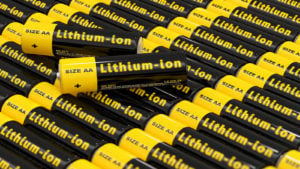After all, we’ve seen this play out before.
In 2018, prices peaked due to oversupply, which led to a massive 60% crash in lithium prices. Miners were forced to close mines and delay projects. In fact, with prices ridiculously low, producers had no incentive to dig, which led to a massive deficit.
By 2022, lithium prices would explode higher because of that deficit, thanks to massive new demand for electric vehicles and all things green.
Today, we’re seeing the same thing play out again.
As many companies have warned, mines will close, projects will be delayed and supply will dry up. Before long, lithium prices will explode again due to underinvestment and a lack of supply, all as the world fights to go green and put millions of EVs on the roads. In short, they use weakness as a reason to buy.
While you can always buy industry giants like Albemarle (NYSE:ALB) and Sociedad Quimica y Minera (NYSE:SQM), some smaller ones should also be worth buying.
American Lithium (AMLI)

American Lithium (NASDAQ:AMLI) was crushed like every other lithium stock.
Since topping out at around $1.50 in September, AMLI is now down to 46 cents. I wouldn’t write it off, though. For one, it’s sitting at double bottom support and oversold on RSI, MACD and Williams’ %R. If you pull up a two-year chart of AMLI, you’ll see that when these indicators align in oversold territory, the AMLI stock will bounce shortly after.
Earlier this year, the company said the estimated value of its Falchani lithium project in Peru tripled to $5.11 billion, with a “potential operating life of 32 years,” said Reuters. Even better, the company plans to commence piloting work for the project this year.
The company also posted better-than-expected earnings with a loss of three cents compared to expectations for a loss of five cents.
Atlas Lithium (ATLX)

Atlas Lithium (NASDAQ:ATLX) is also developing its 100% owned hard rock lithium project in Brazil’s well-known Lithium Valley in Minas Gerais.
Helping, the company just said it’s making substantial progress toward producing lithium by the fourth quarter. It also believes it could produce 300,000 tons by 2025.
ATLX saw a “substantial expansion” of its mineral rights footprint in Brazil, nearly doubling its exploration portfolio.
The company now says it has “the largest lithium exploration footprint in Brazil, totaling 53,942 hectares (approximately 539 km2 or 133,294 acres). To put it into perspective, such an area is greater than nine times that of Manhattan Island in New York.”
We also have to consider that Atlas Lithium is indirectly partnered with Tesla (NASDAQ:TSLA) and BYD (OTCMKTS:BYDDY). ATLX secured a take-off agreement with Chengxin Lithium Group (a lithium chemical supplier to Tesla) and Yahua, which supplies BYD.
Amplify Advanced Battery Metals and Minerals ETF (BATT)

Or, if you’d rather diversify with 90 lithium-related stocks, there’s the Amplify Advanced Battery Metals and Minerals ETF (NYSEARCA:BATT). With an expense ratio of 0.59%, the ETF holds stocks that benefit from developing and producing lithium battery technology. Some of its top holdings include BHP Group (NYSE:BHP), Tesla, BYD, Albemarle and Rivian Automotive (NASDAQ:RIVN).
While the BATT chart is nothing to write home about, I’d use weakness as a long-term buying opportunity. BATT appears to be bouncing around in a tight channel between $8.67 and $9.50. Now that it is back to support at $8.67, I’m looking for a retest of $9.50.
On the date of publication, Ian Cooper did not have (either directly or indirectly) any positions in the securities mentioned. The opinions expressed in this article are those of the writer, subject to the InvestorPlace.com Publishing Guidelines.
On the date of publication, the responsible editor did not have (either directly or indirectly) any positions in the securities mentioned in this article.
Ian Cooper, a contributor to InvestorPlace.com, has been analyzing stocks and options for web-based advisories since 1999.
